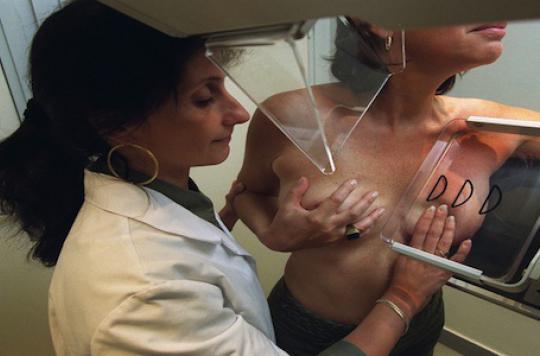While the controversy around overdiagnosis resurfaces, the Minister of Health calls for a reassessment of screening. But she puts forward the argument of access to care to promote mammography.

“When was your last mammogram?” From Saturday, Elise Lucet, Sophie Davant, Nagui and William Leymergie will ask this question to women aged 50 to 74 in the TV spots for the Pink October campaign. They are in fact encouraged, as part of the national campaign for organized breast cancer screening, to perform a mammogram every 2 years.
But this year, the launch of the Pink October campaign by the Minister of Health Marisol Touraine comes as the consumer association UFC-Que Choisir has just revived the controversy over the risk of overdiagnosis. We talk about overdiagnosis when the screening examination, here mammography, can detect a small cancerous lesion, which would not have developed into a disease during the patient’s lifetime. According to studies, this overdiagnosis is estimated at 1% to 50%, the National Cancer Institute (INCa) retaining the figure of 5 to 10% for France. However, this overdiagnosis leads to additional examinations and heavy treatments (radiotherapy, chemotherapy, ablation) which are ultimately useless since the cancer would not have started. For the UFC-Que Choisir, women are not sufficiently informed of this risk of overdiagnosis when they are encouraged to have a mammogram.
Marisol Touraine is committed to ensuring that all the necessary information is given to the women concerned. In particular, it asked INCa to reassess as quickly as possible the rate of overdiagnosis and the reduction in breast cancer mortality in women screened in France.
Two elements which weigh a lot in the evaluation of the benefit / risk of screening. However, these two figures are the subject of controversy among scientists. For the decline in mortality observed among screened women, the Institute for Public Health Surveillance retains the figure of 21%, based on several studies carried out in Europe when other studies consider it almost non-existent. But beyond this battle of figures between specialists, the minister and the president of INCa insisted that faced with breast cancer responsible each year for 53,000 new diagnoses and 11,000 deaths in France, “the balance benefits -Risk of screening remains positive ”.
Advances in research should soon help end the controversy by limiting the problem of overtreatment. The current difficulty is not being able to distinguish at the time of screening whether it is an aggressive cancerous lesion or indolent and not very progressive. Researchers are currently seeking to identify genetic markers predicting the aggressiveness or not of a tumor.
Listen to Prof. Agnès Buzyn, hematologist and president of INCa: “Within 5 years, we will be able to distinguish aggressive tumors from tumors that will not evolve”
In the meantime, the Minister of Health wished to recall the interest of a generalized screening which allows all the women concerned to hear about breast cancer and to be able to do a mammogram supported by social security.
Listen to Marisol Touraine, health Minister : “My responsibility is to guarantee all women who want it access to screening”
“Women have the choice to go for screening or not, but this freedom requires being informed. Yet today nearly a third of women aged 50 to 74 are not screened and among them the most disadvantaged who probably do not do so by choice, ”insisted the Minister.














